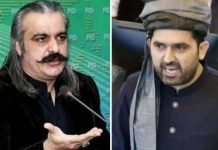ISLAMABAD: The process for filling the vacant position of Chief Election Commissioner (CEC) commenced on Tuesday, with the formation of a12-member parliamentary committee which would make the appointment in case the prime minister and opposition leader in the National Assembly failed to agree on a nominee.
According to a notification issued by the National Assembly Secretariat, the newly-formed committee comprises Senators Rafiq Rajwana, Sardar Yaqoob Khan Nasir (PML-N), Islamuddin Shaikh (PPP) and Haji Adeel (ANP) and Members of the National Assembly retired Captain Muhammad Safdar, Sardar Arshad Khan Leghari, Dr Darshan, Muhammad Junaid Anwar Chaudhry (PML-N), Nawab Yusuf Talpur, Ayaz Soomro (PPP), Dr Farooq Sattar (MQM) and Shehryar Afridi (PTI).
Under article 213 (2B), the parliamentary committee constituted by the speaker is to comprise 50 per cent members from the treasury benches and 50 per cent from the opposition parties, based on their strength in the parliament, to be nominated by the respective parliamentary leaders. But the speaker chose not to give representation to any of the ruling party’s allies and appointed all the six members from the treasury quota from the PML-N.
Under the law no person is to be appointed as commissioner, unless he is, or has been, a judge of the Supreme Court or is, or has been, a judge of a high court and is qualified to be appointed as a judge of the Supreme Court.
The prime minister, in consultation with the leader of the opposition in the National Assembly, will forward three names for appointment of the commissioner to the parliamentary committee for hearing and confirmation of one person. In case there is no consensus between the prime minister and the opposition leader, each shall forward separate lists to the parliamentary committee for consideration which may confirm any one name.
The previous Chief Election Commissioner retired Justice Fakhruddin G Ebrahim had resigned on July 3, a day after presidential polls as a mark of protest against the decision of the Supreme Court to amend the schedule for the election on a petition filed by one of the PML-N legislators, as he believed it was an encroachment upon the domain of the commission mandated under the constitution to conduct and supervise the polls.
Justice Ebrahim wanted to set aside the decision of the Supreme Court, but could not muster support of the ECP members, some of whom had pointed out that it would be tantamount to inviting contempt of court proceedings. The position taken by the members was disappointing for Justice Ebrahim and he decided to resign soon after the presidential polls were over.
The law ministry had notified the vacancy of the Chief Election Commissioner’s office on August 13. Soon after receiving a copy of the notification on August 15, the ECP had sent a reference to the Supreme Court for appointment of an acting Chief Election Commissioner.
Justice Tassaduq Hussain Jillani was nominated as the acting Chief Election Commissioner days before the largest ever by-elections held on August 22. He will continue to hold the office till the appointment of a new CEC for a five-year term through parliamentary procedure.
Analysts observe that the formation of a parliamentary committee was reflective of the government’s desire to have a regular CEC in a few weeks.











